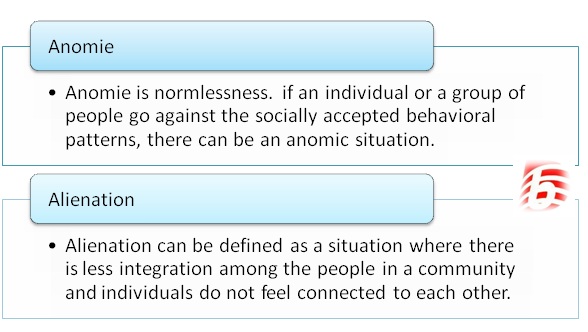Anomie vs Alienation
In this article, we will explore the differences between Anomie and Alienation, two sociological terms that describe different states of human beings in society. Anomie can be understood as normlessness, where an individual or group goes against socially accepted behavioral patterns, leading to a breakdown of social bonds between individuals and society. On the other hand, Alienation is a situation where there is less integration among people in a community, causing individuals to feel disconnected from each other and more isolated.
What is Anomie?
Anomie, or normlessness, refers to the lack of adherence to socially accepted values and norms within a community. Norms are important because they make it easier for people to live together and predict each other’s behavior. The concept of anomie was introduced by French sociologist Emile Durkheim, who saw it as a breakdown of social regulations. In an anomic situation, there can be a mismatch between the wider social etiquette and the individual or group who does not follow this standard. Durkheim suggested that anomie could lead to suicide when individuals find it difficult to hold on to community-accepted values and ethics, resulting in feelings of futility, purposelessness, despair, and distress.
What is Alienation?
Alienation describes a state where individuals feel estranged from others or from a specific community. Karl Marx’s “Theory of Alienation” is a key reference when discussing alienation. Marx described alienation in capitalist society, using workers as an example. A worker may become alienated from the objects produced because they are not their own creations, but rather orders from an employer, leading to a lack of sense of belonging. Furthermore, workers can become alienated from themselves due to long working hours without personal time. Marx outlined four types of alienation in a capitalist society, but alienation can occur in any type of society when there is a lack of integration and belongingness.
What is the difference between Anomie and Alienation?
Both Anomie and Alienation discuss human status in society and the individual’s relationship with societal conditions. Both situations involve resistance to existing social phenomena and result in isolation and confusion. However, there are differences between the two concepts. Marx’s theory of alienation describes a situation where an individual is forced into alienation, while anomie is a choice by the individual to resist social norms and ethics.
Key Takeaways
- Anomie refers to normlessness, where individuals or groups go against socially accepted behavioral patterns, leading to a breakdown of social bonds between individuals and society.
- Alienation describes a state where individuals feel estranged from others or from a specific community, causing a lack of integration and belongingness.
- Both terms discuss human status in society and the individual’s relationship with societal conditions, but while alienation is often forced upon an individual, anomie is a choice by the individual to resist social norms and ethics.
